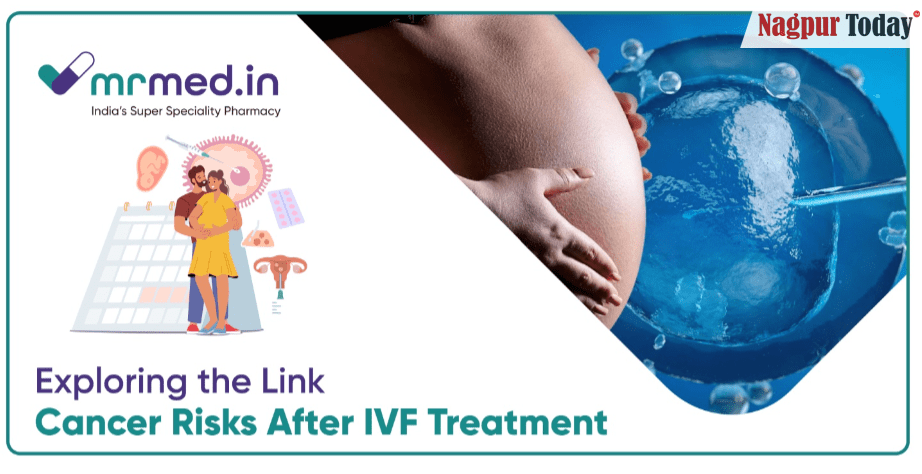
Hormonal Stimulation: To start the IVF process, a woman is first given hormonal injections. After that, egg retrieval and embryo transfer follow. Each move is well thought out. However, the medicines and procedures of IVF have some concerns regarding their long-term effects, including the public health spectre in case patients actually catch cancer. This blog goes on to address multiple such queries and look at studies that determine the cause-and-effect relationship.
What is IVF?
In-vitro fertilisation (IVF) is a scientific method used to help those who cannot become parents naturally. It involves using hormones to gather eggs, fertilising them outside the female body, and then chipping the embryo back into the uterus via a small operation.
Although, for many years, cumulated research studies–myths included potential links between IVF and increased risk of cancer such as ovarian and breast cancers. Now, to complicate things, there are many variables involved here. Here is what we are going to go through step-by-step.
What are the techniques used in IVF?
Three main procedures doctors recommend for those who decide to opt for IVF:
- The first one is hormone treatment, which is absolutely essential. It helps prepare the body for different stages of the procedure. Ovulation induction is about getting the ovaries to produce more eggs. This is usually done by giving specific IVF medications.
- Next, doctors give injections of ovulation-inducing medications like Gonal-F 300IU Injection at the right times. These often include hormones like follicle-stimulating hormone (FSH) and luteinising hormone (LH). They help manage and improve the growth of multiple mature eggs in the ovaries.
- Last but certainly not least, controlled ovarian stimulation greatly helps in getting more eggs. This can then increase the chances of successful fertilisation and embryo development during the IVF cycle.
Can IVF increase the risk of cancer?
The possible connection between IVF and cancer is a topic of research and debate by multiple scientists. Let’s take a look at what has been done so far:
1. Research Studies on IVF and Cancer Incidence
Data from multiple research studies has been clubbed in the table below. This kind of summarises what are the things you should take into account while going for IVF therapy:
| Cancer Type | Risk Estimate (IVF vs. Natural Conception) |
| Breast Cancer | Not significantly increased in most studies |
| Ovarian Cancer | Slightly increased risk in some studies |
| Other Cancers | No consistent evidence of increased risk |
Some studies do indicate a somewhat elevated risk for certain cancers, such as ovarian cancer; it’s essential to note that the overall rate of cancer among women who undergo IVF remains relatively low.
Is there a link between breast cancer and IVF?
The link between IVF and breast cancer is important because of the hormones that increase the risk.
- Initial studies raised concerns that IVF treatments could lead to an increased risk of breast cancer due to the hormonal stimulation involved.
- However, recent large-scale studies with extended follow-up periods have found no significant spurt in breast cancer cases for women who undergo IVF compared to those who conceive naturally.
- The latest evidence suggests that if there is any increased risk of breast cancer associated with IVF, it is likely to be very small and not clinically significant.
- Researchers continue to study the long-term effects of IVF on breast cancer risk, but current data are reassuring for women considering or undergoing fertility treatments.
- Overall, the perceived link between IVF and breast cancer risk has been largely debunked by more robust and comprehensive research, offering peace of mind to patients.
Ovarian Cancer Risks with IVF Treatments
Ovarian cancer is another kind of cancer-related to women’s health, and it has been studied with IVF treatments. The link with ovarian cancer is not as clear as it is with breast cancer. Still, some research shows a small increase in the risk of ovarian cancer for women who have had IVF.
The reasons for ovarian cancer are complicated and not entirely known. Also, issues with fertility, whether or not someone uses IVF, have been linked to a slightly higher risk of ovarian cancer in certain studies.
When trying to separate the effects of IVF from other risks, like infertility itself, more study is needed. As with breast cancer, if IVF raises the risk of ovarian cancer, it is probably a small increase.
Other Cancers Considered in IVF Studies
Researchers have looked into the possible connection between IVF treatment and the risk of childhood cancer in kids born from these methods. Some studies have tried to see if IVF might relate to certain types of childhood cancers.
However, the results were not the same for every study. Some show no major rise in the risk of cancer or specific types of childhood cancer in kids from IVF. Yet, others suggest there might be a link. The difficulty is figuring out how much IVF is a factor without mixing in other influences.
For example, unexplained infertility, which is a common reason couples choose IVF, may be linked to a slightly higher risk of some childhood cancers. We need more research to understand if IVF works alone in raising the risk of childhood cancer or if it points to other issues.
Addressing Common Concerns and Misconceptions
Common misunderstandings often come from fears about medical treatment and the need for easy answers in complicated situations.
- One of these misunderstandings is the idea that IVF causes cancer. While some studies look into this, no research has shown a direct link between IVF and cancer.
- Another misunderstanding is that IVF medications Like Menopur 1200IU Injection cause cancer themselves. Some of these medications can affect hormone levels, but they go through strict testing to ensure they are safe and work well.
- It is important to note that the amount and length of time people use these medications during IVF are usually short.
Preventive Measures and Recommendations
Research is still underway to determine how IVF affects cancer risk. In the meantime, it is smart to take steps to stay healthy. Living a healthy life is important. This means exercising often, eating a balanced diet, and keeping a healthy weight. These habits can help you to reduce cancer risk after IVF treatment?
Also, women thinking about IVF should talk to their doctor about their health and family history. It’s important to mention any past issues with cancer or any genetic risks.
- Regular check-ups and following cancer screening guidelines are very important for everyone, including those who have had IVF. Finding cancer early can greatly improve the success of treatment.
- Women who have had IVF should talk with their doctor about when and how often to get cancer screenings. These screenings include mammograms for breast cancer and Pap tests for cervical cancer.
- Besides regular screenings, it’s essential to stay alert for any worrying symptoms. It’s also very important to get medical help quickly when issues arise. Early detection and quick action are key parts of effective cancer treatment.
- Adopting a healthy lifestyle has many benefits. It can reduce the risk of different diseases, including certain types of cancer.
- For people who have had IVF, doctors often suggest keeping a healthy weight. Being overweight has been linked to an increased risk of many cancers.
- Dietary advice usually encourages eating a balanced diet. This includes lots of fruits, vegetables, and whole grains. It is also important to cut back on processed foods, sugary drinks, and red meat.
- Making these diet changes can help lower inflammation and provide antioxidants, which may reduce cancer risk.
- Adding regular exercise to your routine can help, too. Aim for at least 150 minutes of moderate exercise or 75 minutes of intense exercise each week.
Frequently Asked Questions
Does IVF Increase the Risk of Cancer?
Current research does not indicate a big rise in the risk of cancer linked to vitro fertilisation. Some studies hint at a possible higher risk, but more research is necessary. This will help us understand if there is a true connection between IVF and increased cancer risk.
Are Certain IVF Protocols More Risky Than Others?
It is unclear if certain ART procedures in IVF cycles have a higher risk of cancer. Research is looking into whether different methods or changes in infertility treatment might relate to other risk factors. However, we need more data to confirm this.
How Can IVF Patients Minimize Their Cancer Risk?
People can lower the risk by making some healthy lifestyle changes. This includes eating a balanced diet and exercising regularly. Also, finding problems early is very important. Regular screenings and self-exams can help with that.
Some studies have looked at connections with cancers, like breast and ovarian cancer, but they are not conclusive yet. IVF patients need to stay informed. They should have the right screenings and live a healthy lifestyle to reduce any risks.















